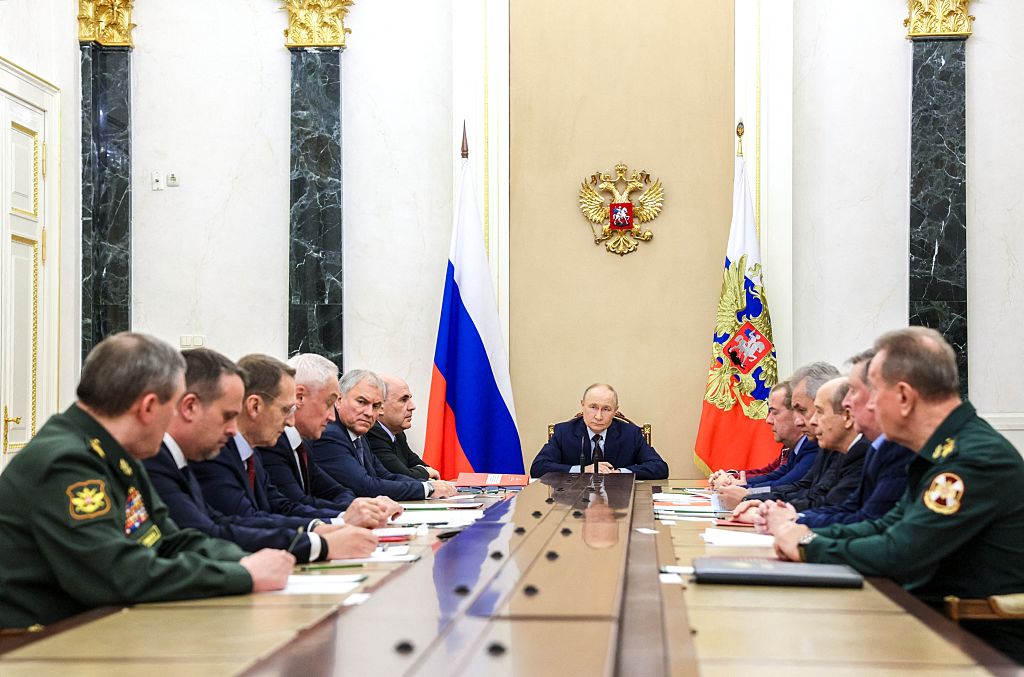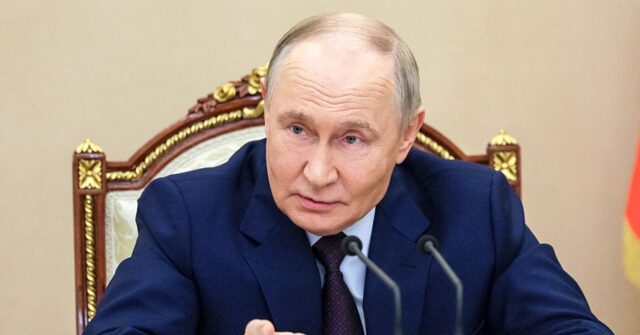The Russian President has instructed senior officials in his government to examine the state of preparedness of its nuclear weapons establishment to perform a live test — which could be the first in over 30 years, given the Comprehensive Nuclear Test Ban Treaty — if it were deemed necessary. The conversation took place during a meeting of Putin’s Security Council which, a Russian newspaper claims, was supposed to be on road safety but which got diverted into nuclear weapons instead.
The question of preparedness came, it is stated, in response to comments by U.S. President Donald Trump last month that he had instructed “the Department of War to start testing our Nuclear Weapons” on an “equal basis” to other nuclear powers.

In this pool photograph distributed by the Russian state agency Sputnik, Russia’s President Vladimir Putin chairs a Security Council meeting at the Kremlin in Moscow on November 5, 2025. (Photo by Gavriil Grigorov / POOL / AFP) (Photo by GAVRIIL GRIGOROV/POOL/AFP via Getty Images)
Putin told officials not just to make plans to potentially resume nuclear testing in the future, but also to investigate the intentions of the United States to understand what it has planned. The meeting was reportedly in some confusion over what exactly it is President Trump intends, and Moscow has complained this week that it has requested clarification from Washington on what it plans but that it has received no response.
Russian broadsheet Ведомости (‘The Record’) reports that during the meeting, Russia’s Putin stated that he would not resume nuclear tests unilaterally and would only do so in response to an American live nuclear test. He is reported to have said: “In my 2023 address to the Federal Assembly, I stated that if the United States or other countries conduct such tests, Russia will be required to take appropriate retaliatory measures”.
Putin’s senior ministers were reportedly enthusiastic about moving quickly to make Russia ready for a nuclear test, so that if the United States performed one, the Russian Federation would be ready to demonstrate its own ability quickly afterwards. The Associated Press states Defence Minister Andrei Belousov told the meeting that the old Soviet Union nuclear testing facility in the Novaya Zemlya archipelago in the Arctic is kept maintained and could be made ready quickly.
General military chief Valery Gerasimov, on the other hand, emphasised starting preparations early is important because it could take “several months to several years” to be ready to conduct a test.
Doubtless mindful of the escalatory nature of such talk, after the meeting Vladimir Putin’s personal spokesman Dmitry Peskov added extra context, and emphasised that Russia did not intend to be a first-mover in breaking the 1996 Comprehensive Nuclear Test Ban Treaty. Russia is not preparing for nuclear tests, he said, but rather preparing to prepare.
The Kremlin spokesman said: “President [Vladimir] Putin reiterated that Russia remains committed to all its obligations under the Comprehensive Nuclear-Test-Ban Treaty.
“We remain faithful to our undertakings. However, given everything that the participants in the Security Council’s operational meeting said at the beginning of the session, Putin has instructed to assess whether it is necessary to begin preparations… Thus, we are not starting preparations right now; we are first trying to figure out whether we need to start them, given what we are hearing from the United States. It is very important to understand this and to clearly see Russia’s intentions”.
The United States said at the weekend, through Energy Secretary Chris Wright, that it was likely any U.S. nuclear tests would be of everything up to the actual blast itself. He said: “I think the tests we’re talking about right now are system tests… These are not nuclear explosions. These are what we call noncritical explosions.”
This nuclear rhetoric follows months of talk and action on the subject, reflecting tensions over the Ukraine War. Routine nuclear drills by both sides have recently taken place and Russia now claims to have successfully tested, for the first time, a long-discussed nuclear-powered ramjet missile. Russia has boasted — as it does for all of its new weapons systems as a matter of due course — that this new missile, which can loiter in the sky for days at a time, can’t be shot down.
This claim is unproven and doubtful. While the missile is reportedly designed to fly at very low altitudes to fox efforts at detection, the limitations of the nuclear-heated air propulsion would not see it travel at enormous speed. Realistically the greatest fear over the system is that any accident or shootdown, would necessarily mean nuclear material being spread over a potentially large area by an explosion or crash.
The United States had previously experimented with the same nuclear propulsion system but gave up on the idea for a variety of reasons, including safety. Ukraine has castigated Russia for testing what it characterises as a “flying Chernobyl”, in reference to the late-Soviet nuclear disaster in 1986.
Amid this nuclear sabre-rattling, at least some in NATO have decided to play things cool. As reported by Romanian media this week, in comments in Bucharest the Secretary General of NATO Mark Rutte shrugged off Putin’s nuclear talk, responding laconically: “I’ve long stopped reacting to the meetings that Putin organizes. He’s paid as the president of Russia, that’s why he organizes them.”
Breitbart News
Read the full article .


